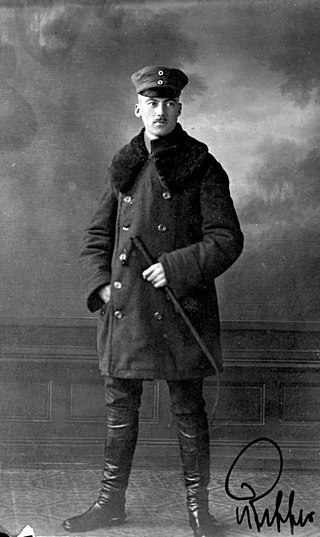Related Research Articles

Hans Josef Maria Globke was a German administrative lawyer, who worked in the Prussian and Reich Ministry of the Interior in the Reich, during the Weimar Republic and the time of National Socialism and was later the Under-Secretary of State and Chief of Staff of the German Chancellery in West Germany from 28 October 1953 to 15 October 1963 under Chancellor Konrad Adenauer. He is the most prominent example of the continuity of the administrative elites between Nazi Germany and the early West Germany.
Helmut Schelsky, was a German sociologist, the most influential in post-World War II Germany, well into the 1970s.
Arnold Gehlen was an influential conservative German philosopher, sociologist, and anthropologist.

Reinhard Gehlen was a German lieutenant-general and intelligence officer. He was chief of the Wehrmacht Foreign Armies East military intelligence service on the eastern front and a leading member of the anti-Nazi 20 July plot during World War II. During the early Cold War, Gehlen sided with the Western Allies as the spymaster of the CIA-funded anti-Soviet Gehlen Organisation (1946–56) and the founding president of the Federal Intelligence Service of West Germany (1956–68).

Hans Freyer was a German conservative revolutionary sociologist and philosopher.

Franz Pfeffer von Salomon during the Nazi regime known as Franz von Pfeffer, was the first Supreme Leader of the Sturmabteilung (SA) after its re-establishment in 1925. Pfeffer resigned from his SA command in 1930 and was expelled from the Nazi Party in 1941. He died in 1968.
Conservatism in Germany has encompassed a wide range of theories and ideologies in the last three hundred years, but most historical conservative theories supported the monarchical/hierarchical political structure.
The German Sociological Association is a professional organization of social scientists in Germany. Established in Berlin on January 3, 1909, its founding members included Rudolf Goldscheid, Ferdinand Tönnies, Max Weber, and Georg Simmel. Its first president was Tönnies, who was forced out of office by the Nazi regime in 1933; his successor, Hans Freyer, attempted to reform the DGS on Nazi lines but ultimately decided to suspend its activities the following year. The DGS was revived after World War II under the chairmanship of Leopold von Wiese in 1946, and has remained active since then, with about 3,200 members as of 2019.
Ernest Manheim, known as Ernő until 1920, Ernst until 1934, and then Ernest in the United States, was an American sociologist, anthropologist, and composer born in Hungary, at that time part of the Austro-Hungarian Empire.
Hans Diller was a German classical scholar and historian of ancient Greek medicine.
Werner Conze was a German historian. Georg Iggers refers to him as "one of the most important historians and mentors of the post-1945 generation of West German historians." Beginning in the 1998, Conze's role during the Third Reich and his successful postwar career in spite of this became a subject of great controversy among German historians.
The Gehlen Organization or Gehlen Org was an intelligence agency established in June 1946 by U.S. occupation authorities in the United States zone of post-war occupied Germany, and consisted of former members of the 12th Department of the German Army General Staff. It was headed by Reinhard Gehlen who had previously been a Wehrmacht Major General and head of the Nazi German military intelligence in the Eastern Front during World War II.
The Center for Interdisciplinary Research is the Institute for Advanced Study (IAS) in Bielefeld University, Bielefeld, Germany. Founded in 1968, it was the first IAS in Germany and became a model for numerous similar institutes in Europe. The ZiF promotes and provides premises for interdisciplinary and international research groups. Scholars from all countries and all disciplines can carry out interdisciplinary research projects ranging from one-year research groups to short workshops. In the last 40 years numerous renowned researchers lived and worked at ZiF, among them the social scientist Norbert Elias and Nobel Laureates Reinhard Selten, John Charles Harsanyi, Roger B. Myerson and Elinor Ostrom.
The Association of Revolutionary Visual Artists of Germany was an organization of artists who were members of the Communist Party of Germany. Known primarily by its shortened name, "Asso", it was founded in March 1928. The organization produced posters, placards, propaganda graphics for Communist organizations.

Bekenntnis der Professoren an den Universitäten und Hochschulen zu Adolf Hitler und dem nationalsozialistischen Staat officially translated into English as the Vow of allegiance of the Professors of the German Universities and High-Schools to Adolf Hitler and the National Socialistic State was a document presented on 11 November 1933 at the Albert Hall in Leipzig. It had statements in German, English, Italian, and Spanish by selected German academics and included an appendix of signatories. The purge to remove academics and civil servants with Jewish ancestry began with a law being passed on 7 April 1933. This document was signed by those that remained in support of Nazi Germany.
Georg Pfeffer was a German anthropologist. Born in 1943 in Berlin to a German sociologist father and a British mother, he was schooled in Hamburg. In 1959, he moved to Lahore with his family, and studied at the city's Forman Christian College for 3 years. Later, he moved back to Germany and studied at the University of Freiburg where he also completed his Ph.D.
Elly Lotte Bergtel-Schleif, née Schleif, was a German librarian who was actively involved in the resistance against Nazis while a member of the Communist Party of Germany (KPD). Bergtel-Schleif became head of the Berlin Library School after the war.
References
- ↑ Vgl. Harald Wiese: Eine Zeitreise zu den Ursprüngen unserer Sprache. Wie die Indogermanistik unsere Wörter erklärt. Logos-Verlag, Berlin 2007, ISBN 978-3-8325-1601-7 (2., durchgesehene und korrigierte Auflage. ebenda 2010).